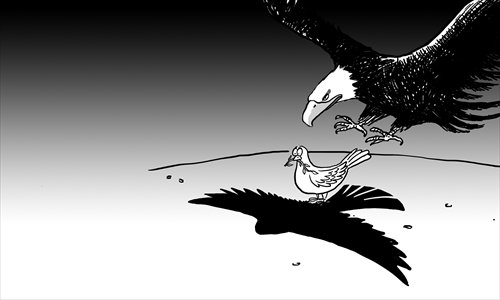Shadow of war hasn't yet disappeared from East Asia

Editor's Note:
As tensions in East Asia grow, driven by conflicts over islands, China's rising power, and the renewed US role in the region, some find the situation disturbingly reminiscent of Europe in the 1910s. Could the region be drawn into a wider war? Or will trade and economic interdependence keep peace in place? The Global Times invited two writers to comment.
History does offer clues to contemporary international relations, but simple comparisons can sometimes lead to misleading, if not dangerous, conclusion.
The surging nationalism in East and Southeast Asia, stirred by territorial disputes, is seen by some scholars as similar to the situation of Europe before World War I. In particular, the rise of China is singled out as the most uncertain element of regional security.
It's true that a new rising power causes apprehension among its neighbors, as happened in history when the previous power structures were broken. In the case of East and Southeast Asia today, the situation is complicated by the US pivot to the region.
Washington is shifting resources to the Asia-Pacific region to maintain its influence in this economic booming area, and to keep China, deemed its biggest potential challenger, in check.
The maneuver puts China in a security dilemma, which makes China feel under pressure to strengthen its defense capabilities. The US move also chills the cooperative atmosphere in the area. Efforts at boosting regional integrity on many fronts, from the established ASEAN 10+3 framework to the nascent East Asia Community concept, have been experiencing frustration. Countries in the region are feeling forced into a choice between China and the US.
There are also other explosive factors in the region that may trigger serious clashes. Japan, trapped in protracted economic hibernation, diminishing global influence, and with mixed feelings toward its rising neighbor, is gradually turning to the right.
Frequent political reshuffling hasn't brought a cure for national woes, but only produced more hawkish politicians. Territorial disputes have been provoked not only with China, but also with South Korea and Russia. Japan may find it difficult to position itself correctly in the region any time soon. But politicians in Tokyo are starting to reassess their previous strategy over the Diaoyu conflict, and remedial work is being quietly carried out.
The tensions reflect a much broader strategic competition. Economic interdependence may not be able to solely prevent the occurrence of war, but it provides more opportunities at times of diplomatic bickering.
Almost a century after World War I, while national sentiments can still be intensively aroused by a specific issue, such as territorial disputes or trade conflict, it will be much harder to unite public support behind a war. Europe, after centuries of interstate war, is adept at the use of political institution to forestall outbreaks of conflict. Their experiences are certainly relevant to other parts of the world.
That said, the mechanisms in place can't rule out the possibility of war in East Asia. The scars of the past invasions haven't been healed, economic deterioration is deepening the sense of crisis in some countries, and irresponsible politicians are manipulating public sentiment for short-term gain. In that sense, the shadow of war hasn't really gone away.
The author is a commentator with the Global Times. opinion@globaltimes.com.cn